Corrective Jaw Surgery – Fair Oaks, CA
Achieve a Harmonious Bite
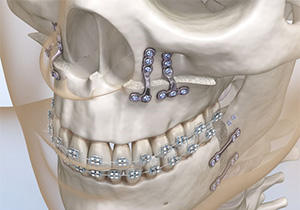
If you struggle with a severe malocclusion (a bad bite), speech problems, and related issues, you might need corrective jaw surgery. Dr. Ji is an experienced oral surgeon who can perform this procedure to help patients in the Fair Oaks community to achieve a harmonious bite, improve their oral and overall health, and enjoy an enhanced overall quality of life. Are you interested in learning more about corrective jaw surgery? Read this page, and then contact our team to book a consultation.
What Is Corrective Jaw Surgery?
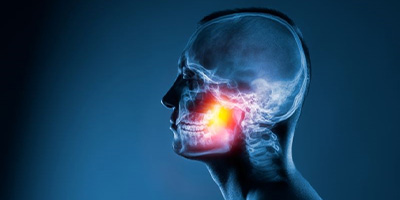
Most of the time, issues like overbite and underbite can be corrected via orthodontic treatment. This non-surgical approach is low risk and can usually achieve satisfactory results. In some instances, though, a problem is severe or complex enough that corrective jaw surgery, (also called orthognathic surgery) is necessary.
Dr. Ji may work alongside your orthodontist to design a streamlined treatment plan that has the goal of optimizing your jaw function, enhancing your appearance, and reducing your risk of numerous oral health problems.
Who Needs Corrective Jaw Surgery?
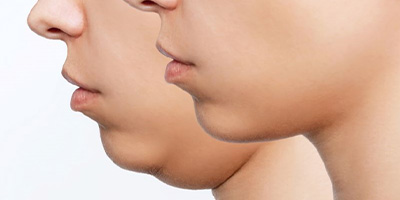
Corrective jaw surgery is used to benefit people who have severe bite problems or improperly positioned jaws. Such issues may arise due to a person’s natural growth patterns, which are influenced by genetics. For example, the upper and lower jaws may grow at different rates and therefore not work together properly. Other factors, such as injury or environmental influences, may also play a role in contributing to the need for orthognathic surgery.
Signs and Symptoms of Jaw Problems

Do you suspect that you need corrective jaw surgery? Your orthodontist or Dr. Ji can let you know for sure whether this procedure is necessary. Of course, you should also stay on the lookout for signs and symptoms that indicate the need to schedule a consultation, such as:
- Difficulty with chewing, swallowing, and biting
- Speech problems
- Chronic pain in your jaw
- Persistent symptoms of TMJ disorder, such as headaches, facial soreness, and lockjaw
- A protruding upper or lower jaw (underbite or overbite)
- An open bite
- Breathing problems, such as chronic mouth breathing or apneas (pauses in breathing during sleep)
- Gum problems
- Early tooth loss
What to Expect

Here is a general overview of the orthognathic surgery process:
- You may first need to undergo orthodontic treatment.
- Ji will use X-rays and other techniques to thoroughly examine your jaws and carefully plan the details of your surgery.
- The surgery is usually performed under general anesthesia. Some patients need to stay overnight in the hospital.
- During your recovery, you may need to adhere to a liquid diet for a while. As you heal, you will gradually be able to incorporate some soft, solid foods into your diet. After you finish recovering, you will be able to eat normally.
Within a few months of your surgery, you can expect to notice some significant benefits. For example, you may find it easier to eat your favorite foods. You may snore less and enjoy improved sleep quality. Headaches and migraines may become less frequent. You might even find that your facial profile is more attractive than it was previously.
Lower Jaw Surgery
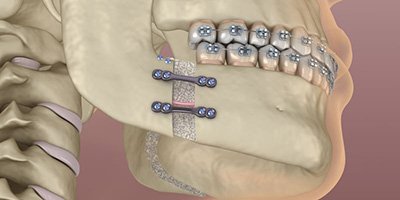
If your lower jaw is not positioned correctly, and regular orthodontic treatment is inadequate to address the problem, you may need to undergo mandibular osteotomy surgery. During the procedure, the mandible is broken in a careful and controlled manner and then moved into its new position. Screws hold it in place as it heals. This procedure can improve chewing and speaking, enhance facial aesthetics, and provide other benefits.
Upper Jaw Surgery
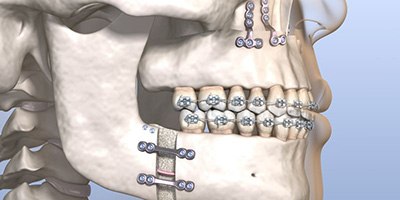
Osteotomy (controlled cutting and reshaping of the bone) also plays a role in upper jaw surgery. If your maxilla is in the wrong position, Dr. Ji can strategically free it from the rest of your facial skeleton and carefully place it in the correct location. Screws and titanium plates will hold it together during your healing period. In most cases, this surgery does not require that the jaw be wired shut, so you will be able to enjoy limited jaw function as you recover.
Corrective Jaw Surgery FAQs
How Long Is the Entire Corrective Jaw Surgery Process?
From start to finish, correcting severe problems with the shape and position of the jaw can take a couple of years. Usually, things get started with several months of pre-op orthodontic treatment. Next, the surgery will occur. After a healing period of a few months, you may need to receive post-op orthodontic care, which could last anywhere from 3 months to a year.
Granted, all of that can seem a little overwhelming! However, the long-term benefits you experience may make the process worth every inconvenience you experience along the way.
What if I Need Corrective Jaw Surgery but Do Not Get It Done?
For various reasons, some patients choose not to undergo corrective jaw surgery despite the recommendations of their medical team. Regular orthodontic treatment might be able to compensate for a portion of the jaw issues you are experiencing, but most severe bite problems cannot be completely addressed without surgical intervention. Plus, an incomplete treatment plan could actually worsen your dental and overall health.
When it comes to severe jaw problems, it is important that an oral surgeon and other qualified dental professionals work together so that the entire dentofacial complex can be properly cared for.
Is Corrective Jaw Surgery Painful?
You will be thoroughly anesthetized for the jaw surgery, so you do not have to worry about pain or discomfort during that portion of your treatment process. However, a degree of post-op discomfort is to be expected. Dr. Ji and our team will give you instructions to help you minimize your pain and encourage a smooth recovery.
